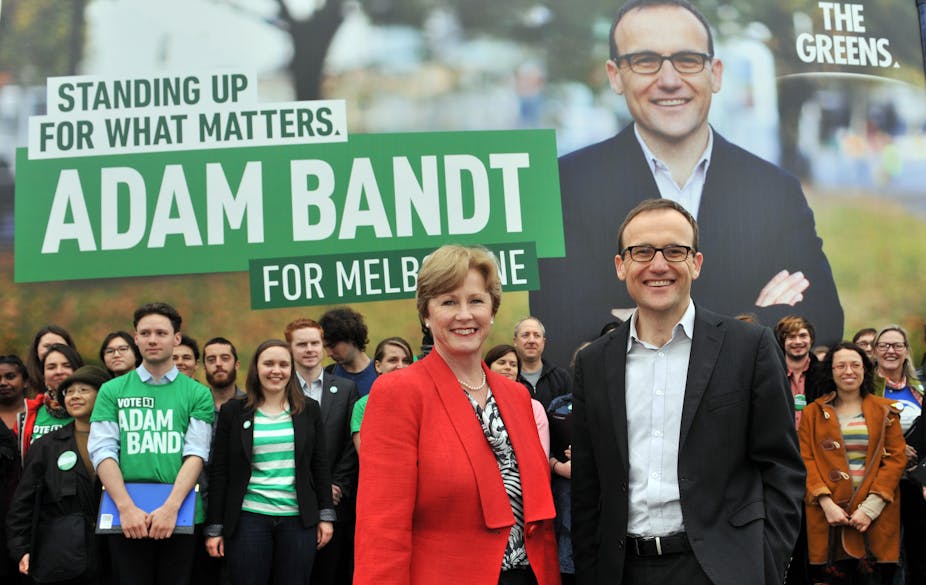Over the weekend, the Labor Party seemed to embark on a media tantrum around their failure to recapture the seat of Melbourne from the Greens’ Adam Bandt. The local Victorian state member for Brunswick, Jane Garrett, vented her frustrations in The Weekend Australian. The main opinion piece in the Sunday Age also centred on this contest, making a great deal of the fact that Bandt outspent his Labor opponent “at least four to one”.
This figure ignores the national campaign altogether — where Labor clearly not only outspent the Greens enormously, but had the advantages of incumbency — but it also ignores the reality that Bandt was well funded because large numbers of people in Melbourne wanted him to win enough to pledge money. Yes, Labor should see this as a warning sign, but as a sign of their own failures - not, as Garrett claims, the negative attacks of the Greens.
This anger at the Greens is not new. In the opening paragraph of his preface to former treasurer Chris Bowen’s book Hearts and Minds, Paul Keating asks whether “the political role of Labor can be replaced in some bifurcation between the Liberals on the right and the Greens on the left”.
That a former Labor prime minister can even ask the question suggests the malaise within Labor, occasioned by the apparent irreconcilable gap between the middle class supporters of the Greens and the traditional union base of the ALP. So, here’s a prediction: the Greens will not become a major party nor will Labor ever regain power without accepting their need to work closely with them.
The decline in the Labor Party vote is a product of both immediate and structural changes. It is more complex than the simplistic idea that the Greens represent people who can afford to vote for values, while Labor represents those who depend on economic growth, a claim repeated by Bowen in his book.
Many Green voters are struggling. Some of them, such as students and single mothers, because Labor governments did little to genuinely assist them. Equally, Labor has retained a large share of the despised “latte-sipping” professional classes. Outside the seat of Melbourne, the ALP easily outpolled the Greens in seats such as Sydney, Adelaide and Melbourne Ports, which are strongholds of the people Bowen claims “don’t need economic growth to be comfortable”.
Indeed, Garrett and Bowen should be far more troubled by the fact that the Coalition beat them in some of the poorest and least educated areas of Australia. Much of what used to be Labor heartland is now strongly Liberal, National or Palmer United in its allegiances. The ALP should be more worried by losing most of their provincial seats — swings in Queensland and Tasmania mean that they now hold virtually no major provincial cities outside Victoria — than Adam Bandt holding Melbourne. In a seat like Capricornia, based around Rockhampton, it was the Palmer United Party, not the Greens, who siphoned off traditional Labor votes.
The immediate problems of the Labor government have been well rehearsed, and indeed to end up with over 46% of the two-party preferred vote after four years of internal warfare is remarkable. But the structural problems would have existed even if Kevin Rudd had either not been deposed or vanished after he was. They are a consequence of a rapidly changing economy, in which more people now work for themselves than are members of unions. They also reflect the larger post-GFC conundrum: that after the obvious flaws of unfettered capitalism were revealed, the Left across the western world has struggled to find a convincing narrative to regain power.
The major exception is possibly Obama’s victory last year. There, Obama combined the appeals of both moderate policies of redistribution with a very targeted appeal to minorities. But among all the many obvious differences one can point to, the United States remains the only significant two party state in the world, only possible because party discipline is so much laxer than it is here.
Instead of attacking the Greens, Labor needs to follow the lead of their conservative rivals. The Liberal and National parties have long accepted that while they may not always agree, a de facto alliance between rural and urban conservatives is necessary to win power. With occasional lapses, the Liberals realise that the Nationals are not their primary enemy. Labor needs to learn this about the Greens.
The rise of an increasing number of voters who are not primarily swayed by economic issues can work for both Left and Right. Under John Howard, the Liberals understood that appealing to socially conservative values could win over voters who might otherwise not support his economic policies.
For a brief period, Rudd seemed to have mastered this - as in the emphasis he placed in the 2007 election on reconciliation, a more humane attitude to asylum seekers, and climate change. Those Labor people who now want to have nothing to do with the Greens forget that many people are voting Green in support of issues that Rudd made central to his election six years ago.
Is it not ironic that Labor is now proclaiming a price on carbon as central to their values, when they only adopted this policy because of pressure from the Greens? And despite the attacks on the Greens, the party’s leader Christine Milne consistently made clear through the campaign that they would not support an Abbott government.
What progressives need is a reconciliation between Labor and the Greens which acknowledges there are differences, but also without cooperation Labor will find it very difficult to ever regain power. This need not mean a formal coalition, but it does mean both sides should acknowledge they have common ground in opposing the growing Right-wing populism to which Tony Abbott so successfully appealed.
Labor’s real enemies are to their Right, not the Left.

